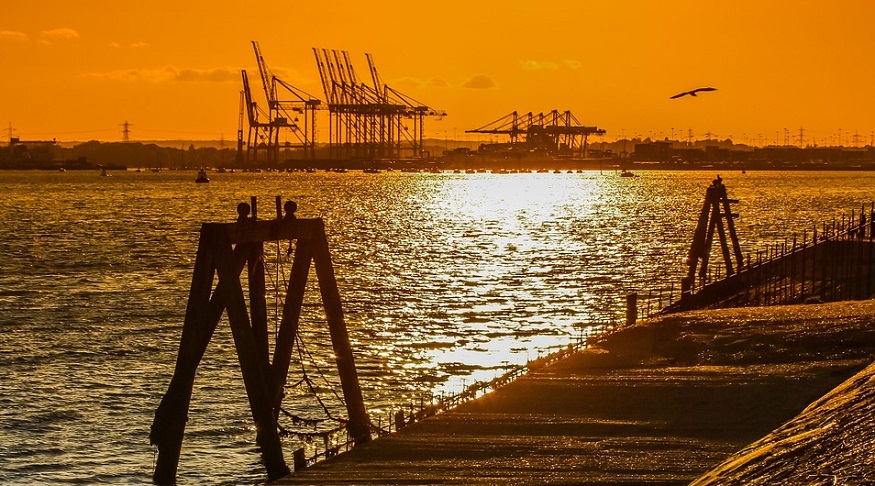
Hydrogen super-hub may be headed to UK’s Port of Southampton
December 16, 2020In its effort to become an H2 leader, the United Kingdom is looking into the viability of the project.
The Port of Southampton in the United Kingdom is being considered as a location for a hydrogen super-hub. The project is in its infancy as the SGN gas network company and Macquarie’s Green Investment Group (GIG) made a funding commitment.
The first step will be to look into the viability of the project before finalizing agreements to move forward.
The partners have hired the WSP engineering consultancy, which will prepare a feasibility study for the hydrogen super-hub at that location. It will investigate the local industry decarbonization opportunities, as well as investigating transport and creating a center of excellence for H2 production and distribution in this part of the United Kingdom. It will look into the viability of accomplishing this goal through hydrogen-based and carbon capture technologies.
The UK Government has identified six major industrial clusters, of which the Port of Southampton is one. These each feature diversity of large energy users, have heavy transport needs and are among the busiest and biggest ports in the United Kingdom. As such, the Port of Southampton currently has a CO2 emission level of about 2.6 million tons per year from the various industrial activities there. The SGN network provides connected customers with their heating.
The hope is that making the location a hydrogen super-hub would greatly reduce its CO2 emissions.
This location would not focus on green H2, but would instead use carbon capture, usage, and storage (CCUS) technology to cut back on the CO2 emissions produced through this hydrogen fuel production. In this way, it would provide a zero-emission fuel while decarbonizing much of the process of its creation. It would provide that locally produced fuel to industries and activities that are currently highly polluting.
“We’re at the forefront of hydrogen exploration and Southampton could easily become a world benchmark for decarbonising whole industrial areas,” said SGN Director of Energy Futures Gus  McIntosh when discussing the hydrogen super-hub project. “That would bring cleaner air, large numbers of jobs, and new economic opportunities in hydrogen production and export.”
McIntosh when discussing the hydrogen super-hub project. “That would bring cleaner air, large numbers of jobs, and new economic opportunities in hydrogen production and export.”



 HFN News is your leading source for fresh hydrogen and renewable energy updates. Amid the fast-paced growth of hydrogen companies, we provide top-notch news and insights about this exciting sector. Our coverage spans from hydrogen cars to global sustainable initiatives, and we highlight the latest in green jobs and developing hydrogen hubs. We invite you to share your local hydrogen news and explore today’s renewable energy job listings on our site. Thanks for choosing HFN News as your trusted guide to the hydrogen and renewable energy world!
HFN News is your leading source for fresh hydrogen and renewable energy updates. Amid the fast-paced growth of hydrogen companies, we provide top-notch news and insights about this exciting sector. Our coverage spans from hydrogen cars to global sustainable initiatives, and we highlight the latest in green jobs and developing hydrogen hubs. We invite you to share your local hydrogen news and explore today’s renewable energy job listings on our site. Thanks for choosing HFN News as your trusted guide to the hydrogen and renewable energy world!
This is excellent news, as mainland Britain lags behind in political support from the UK Government and the lack of incentives from Government to businesses to take up the use of a Hydrogen economy are woeful. Battery Electric Vehicles may have stolen much of the publicity as of late, but for those with knowledge of the renewable energy sector that has been in development since the oil crisis of the mid 1970’s, realise that Battery Electric vehicles are simply a halfway house to ween people off hydrocarbon fuels, it is not the remedy for the long term prosperity of the worlds homes, businesses and heavy industries, only Hydrogen can fulfil the requirements of everyone and if generated using green sources of electricity can be carbon negative. Extensive work and experimentation on handling hydrogen have been conducted in the northern islands of Britain and hydrogen manufacturing and delivery systems have been perfected by ITM Power of Sheffield who make the hardware for hydrogen filling stations. Globally there are certain countries such as Japan and Germany that have gained a certain edge in business acumen. Recently (2-3 years ago) the US company of Walmart, investigated and invested in hydrogen forklift trucks, they proved popular to drive by workers (compared with hydrocarbon fuels) and ticked all the boxes for that massive business. So today, all the pieces of the technology have been invented and versions have been tested in real life, now it needs investment and a short amount of time to actually produce a hydrogen economy that can be duplicated across all countries and addresses all the infrastructure demands of a modern world.